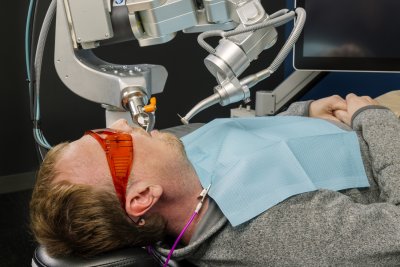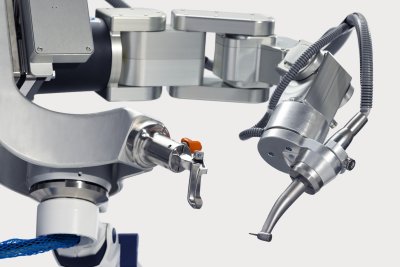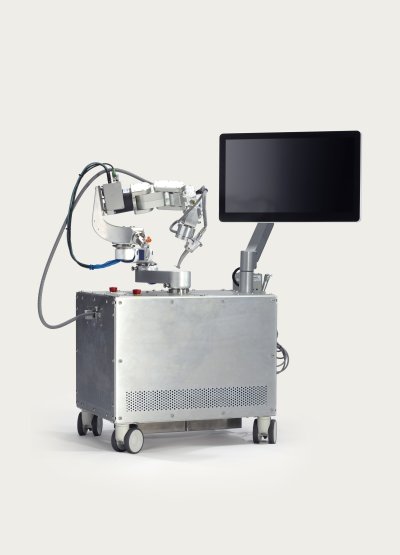An AI robot completed the typically two-and-a-half-hour dental crown procedure on a human volunteer in only 15 minutes.
Perceptive, a company based in Boston backed by Edward Zuckerberg, father of Facebook‘s Mark Zuckerberg, trialed its technology through an in-house human test, and has shared a video of the procedure.
Perceptive announced the first completion of the automated dental procedure on a human using its robotic system on July 30.
Dr. Chris Ciriello, CEO and founder of Perceptive, told Newsweek, “The crown was made off a scan at the exam appointment. From that scan we simulate the cut and in the case of the crown make the crown restoration before cutting the tooth. When the patient returns, the tooth is cut and the crown is cemented in 15 minutes. Our aim was for accuracy, to enable this level of precision as well as timing.”

Perceptive/Perceptive

Perceptive/Perceptive

Perceptive/Perceptive
According to a press release from Perceptive, Zuckerberg, a pioneer in the integration of technology in the dental clinic, said, “The robotics system has been designed and rigorously tested to ensure that dentists can perform treatments safely, even in conditions where patient movement is prevalent. This commitment to safety is core to Perceptive’s dedication to providing reliable and effective dental care solutions using state-of-the art technology.”
German Galluicci, chairman of restorative dentistry at Harvard School of Dental Medicine, was quoted by the release as saying that the technology achieves “over a 90% accuracy rate for detecting caries without the radiation associated with traditional X-rays and CBCT scanners.”
The 15-minute procedure has not been verified for testing with patients.
Traditionally, a crown dental procedure involves a one-and-a-half preparation appointment followed by a 30-minute restoration and then a cementation visit. Perceptive’s system is able to cut this time down to a fractional 15 minutes because the system can simulate the preparation geometry prior to the prepping of the tooth, so the restoration can be manufactured before the preparation of the tooth.
The system uses optical coherence tomography (OCT), which has an accuracy in detecting interproximal caries of 87% sensitivity and 86% specificity for enamel caries, and 85% sensitivity and 97% specificity for dentin caries, according to the company. They say these accuracies alongside the automation of the procedure aims to reduce the likelihood of human error.
Perceptive has said that their advanced optical coherence tomography (OCT), AI programming, and robotics will one day dramatically reduce the time of many standard teeth treatments. They also intend on offering more accurate health assessments than traditionally used X-ray screenings.
They also intend to provide technology, currently still in the prototype stages, for underserved communities.
Perceptive has raised $30 million in funding to date, with leading investors including PDS Health, Dr. Ed Zuckerberg, Innospark Ventures, KdT Ventures, Primavera Capital, Plaisance Capital, Y Combinator, and others.
Do you have a story we should be covering? Do you have any questions about this article? Contact LiveNews@newsweek.com.

إرسال تعليق